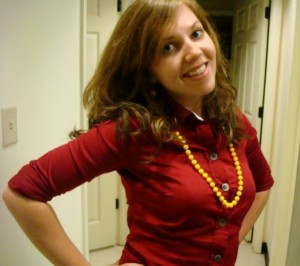Civic Engagement Scholars at Oglethorpe are required to complete a nonprofit internship of their choice during their junior year. Cassie Hendrix ’12 did s0 at The Marcus Autism Center in Atlanta, under the direction of Oglethorpe alumna Dr. Claire Coles ’75. As part of her internship Cassie’s completed weekly journal entries. I thought the ones below were especially poignant and wanted to share it with the Oglethorpe community. – Heather Staniszewski ’02, Assistant Director, Center for Civic Engagement
The Marcus Autism Center: Week Two (5/31/10-6/4/10)
By Cassie Hendrix ’12
Wednesday, June 2, 2010
Today was an extremely hectic day. After waking up at 7 am in order to get to work on time, I show up at the Marcus Autism Center to find that the head nurse was absent. Not only was she absent, but she was without a replacement. So began my day-long stint as the head nurse for the FAS clinic.
Fortunately, there were other nurses around who weighed and measured the kids who came in, but it was almost entirely up to me to make sure everyone was called back to the exam room at the appropriate time, have the parents fill out the proper paperwork, ensure that the correct physical abnormalities were checked off on the dysmorphia checklist, help the families check out completely at the front desk and perform sundry other tasks. On my second day at the clinic ever. Talk about learning quickly.
Overall, it really wasn’t too bad. It was a bit stressful and extremely busy, but I got a lot of support from the people I work with at the FASDE Center. It just so happened that I knew about the nurse’s routines and about what exactly she did during the clinic day (since I worked under her the previous week), hence my temporary promotion. …
Despite the stress, I really enjoyed having more to do and staying constantly busy; I really felt like I was useful and had something to offer the FASDE Center. And the compliments and verbal appreciation I received for working so hard didn’t hurt either. I definitely made mistakes and forgot a couple things, but it was surprisingly okay that I did so – everyone was immensely understanding about my shortcomings. After all, it was only my fourth day at the Marcus Autism Center and my second day at the FAS clinic. The only “bad” part of my day, I suppose, was having a Lego thrown at my face and my foot urinated on by a 15-year-old boy. Even that, though, was more saddening than frustrating.
Thursday, June 3, 2010
Today was much less hectic than the previous one–a blessing for which I was incredibly grateful. I was able to come in a little later and learn things without the constant fear of making mistakes–definitely what I needed after a very frenzied Wednesday. One thing I learned was how to unofficially show children a test cartoon and to monitor, as well as record, their responses (a skill I will hone further when I begin showing it to children on the following clinic day) so that we can adjust the cartoon as needed to achieve the maximum positive effect. I was also shown how to score CBCLs (Child Behavior Checklists). A large portion of my day was actually spent scoring these surveys. I’m sure it’s the type of task that will eventually become monotonous, but for right now, it’s still pretty new and exciting.
Not only did I learn how to score CBCLs, however, I also learned how to interpret these measures of child psychopathology. The purpose of these surveys, I discovered, is not to render an outright diagnosis of the child in question, but rather to serve as a sort of brainstorming tool for the psychologist who is trying to diagnose the child. It’s a survey, so it is not necessarily accurate enough to definitively expose the underlying psychological problems of a child, but it can help to “round out the picture” (as I was told by the psychologist who taught me how to interpret CBCL scores).
I must admit, as cool as learning how to score CBCLs was, my favorite part of the day came from a casual conversation I had with a recently licensed psychologist named Gillian about graduate school. She highly recommended that everyone take a year off of school before beginning graduate school and she advised against working solely towards a higher education. She said that learning shouldn’t just be a means to get a job–what you learn should really become part of who you are. It should help shape your identity.
This concept really struck a chord within me because I know that I have been guilty in the past of doing things for the sole purpose of getting accepted into college or graduate school. But Gillian’s right: everything you do should become part of your sense of self.
Knowledge shouldn’t just be a means to an end–knowledge should be an end in and of itself.
I shouldn’t be worrying so much about being accepted into graduate school. I should instead focus on exploring and pursuing my interests, on letting the activities I pursue truly become part of myself. I should not only invest myself in things, but I should let the things I do invest themselves in me.
I’m really at a point in my life where I should just be exploring and figuring out what I’m passionate about. Don’t get me wrong, I feel that everyone should be in a constant state of exploration and discovery, but we should especially be that way now, during our college years. We should still be forming and reforming our identities, so there’s no reason to become stressed about not having everything figured out yet. We probably never will have everything figured out and I’m finally realizing that that’s okay.

